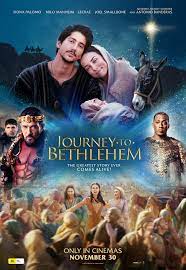
JOURNEY TO BETHLEHEM
US, 2023, 99 minutes, Colour.
Fiona Palomo, Milo Manheim, Antonio Banderas, Joel Smallbone, Geno Segers, Omid Djalili, Rizwan Manji, Moriah, Stephanie Gil, Lecrae.
Directed by Adam Anders.
A musical version of the experiences of Mary and Joseph in Nazareth, the journey to Bethlehem, the birth of Jesus.
More than 50 years ago, Jesus Christ Superstar was a musical version of the last days of Jesus. However, Journey to Bethlehem is not quite in this vein. It is not a “Rock Musical”. Nor is it the equivalent of a Broadway musical. Rather, it takes the main aspects of the Infancy narratives of Matthew and Luke, noting at the end that it has taken some liberties with the drama, and offers the opportunity for the main characters to sing some easily pleasant songs, nothing particularly startling, just easily pleasant. There are some touches of tradition as a young woman who accompanies the Magi does sing one of the traditional advent hymns, Oh, come, O Come, Emmanuel, and at the birth of Jesus, sings Silent Night. And the atmosphere during the final credits is an enthusiastic rendition of the traditional, Go Tell it on the Mountains.
A word that comes to mind as we watch this Gospel musical is “Pantomime”. It is a Christmas pantomime. Underlying it all, of course, are the serious themes of Mary, the Annunciation, the role of Joseph, the birth of Jesus in Bethlehem, the persecution by Herod. Mary, Fiona Palomo, is generally very charming as a strong-minded Mary, trained in the Scriptures by her father, her desire and intention to be a teacher, but an arranged marriage set up – and then, pantomime glitter and echoes of Superstar with the initially bumbling but then glitzy appearance of Angel Gabriel. Joseph is suitably bewildered, likes Mary, is able to adjust to the situation.
However, at various times, there is some pantomime hamming overacting, especially on the part of Antonio Santos as Mary’s father, Joachim, grinning and winking, and with British comedian Omid Djalili as one of the Magi clowning around (and pantomime puzzle never solved: what is myrh exactly and what is it for!). Then, on the other side of humour, there are the pantomime villains, most especially Antonio Banderas as Herod, not particularly the Great, scowling and scheming, intimidating and threatening, jumping and chewing on his songs. And, one of the main targets of his domination is his son, Antipater (Joel Smallbone).
In fact, for an audience familiar with the story, accepting its light touch, the character of Herod Antipas, soldier, dominated by his father, wanting independence, unexpectedly crucial in terms of aiding and abetting the flight into Egypt, is the most interesting dramatic development. And, for those who remember his later role in the Gospels, fascinated by John the Baptist, arresting him, executing him because of his promise to his dancing stepdaughter, and, of course, featuring in Superstar (“walk across my swimming pool”), this portrayal is quite unexpected.
The appeal for this kind of film is obviously for a religious audience, a Christian family audience, church groups. And, with the easy tunes and lyrics, it is one of those musicals that may well appeal to school groups to stage.
- The title, expectations, a musical, (not Rock Opera, not Broadway), available for all communities and schools?
- The treatment of Matthew and Luke’s Gospel stories, the comment about taking liberties? The greatest story ever told?
- The Spanish location photography, the atmosphere of Palestine in Jesus’ time, mountains, deserts, the terrain, the village of Nazareth, the visit to Elizabeth, the journey to Bethlehem, the stable and poor conditions in Bethlehem? The Magi and their homes in the East?
- The songs, the advent Canticle, Silent Night, Go Tell It on the Mountains? The range of songs, tunes and melodies, lyrics, using the Gospel, the irony of the Power and the Glory for Herod and the Magi singing it for Jesus? The tune suited to each of the characters, revealing them, their intentions and hopes? The contrast between the Magi and Herod? Mary and Joseph and the families in Nazareth? Herod and his son?
- The familiar outline of the story, the introduction of Nazareth, Mary, her age, her sisters, studying the Scriptures, hoping to be a teacher, her relationship with her parents, her father smiles, her mother’s advice, the arranged marriage and her reaction? Joseph and his parents arriving, the caution? The gradual revelation of Joseph, his appearance? Mary knowing him, the conversation? The situation and her not wanting to marry?
- The Angel Gabriel, the comic bumbling, the superstar style of his appearance, the words to Mary, her response and questions? The information about Elizabeth, the family saving face by sending Mary to visit Elizabeth?
- Plans for the betrothal, Mary’s sisters, the material for the dress, getting ready, the parents, ceremonies? Mary and her reaction? Joseph, the discussions, the dream, their understanding, the quick ceremony of the marriage, the priest, the kiss?
- The background of Herod, the pantomime villain, his songs, sinister, clothes, behaviour, scowling? His attitude towards his son? His son, military, the soldiers, their songs, military dancing? The issue of the census? Herod against Rome? His son persuading him? The visit of the Magi, their information, Herod’s reaction, the search for mother and child, in Bethlehem? Herod’s son, finding Mary and Joseph, his behaviour, his care, safe passage to Egypt, commanding his soldiers? The audience aware or not of the behaviour of Herod’s son with John the Baptist, the dance, the beheading of John the Baptist, wanting to see Jesus at his passion?
- The Magi, the three, touches of comedy, astronomy, the Scriptures, the travels, to Herod, the search, Bethlehem, their suspicions of Herod, finding the stable, the gifts, the joke about murder, singing Silent Night?
- The aftermath, Jesus as a boy, Mary and Joseph, reminiscences of the past – and into his future?